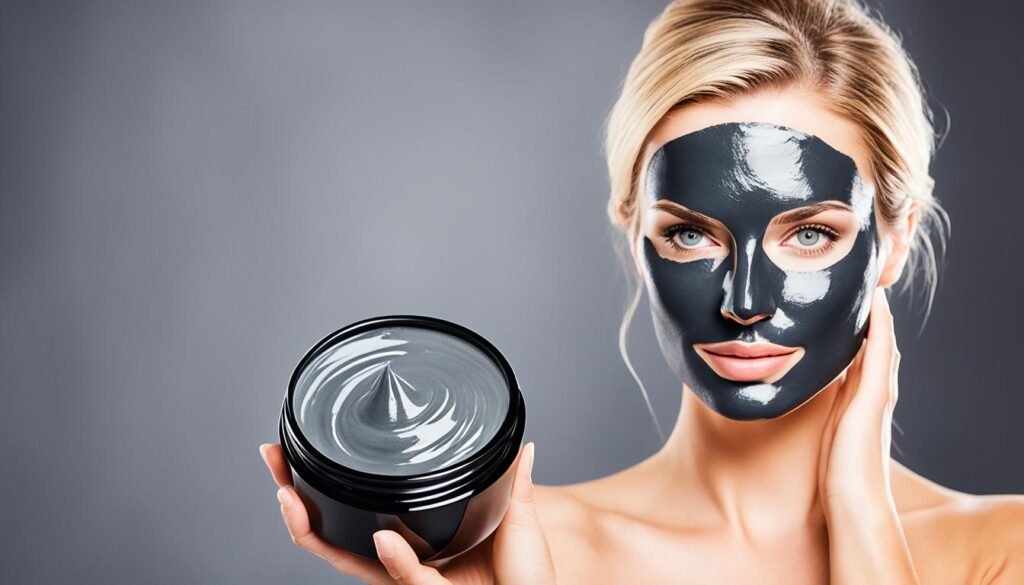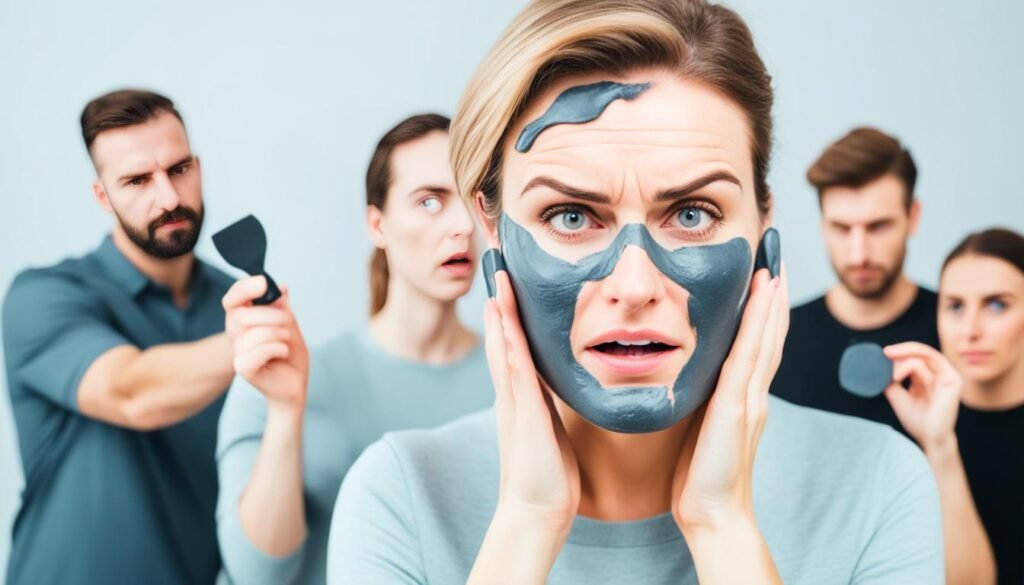Are you looking for a skincare product that can take your cleansing routine to a whole new level? Look no further than charcoal masks. These masks have been making waves in the beauty world, and for good reason. But what exactly are the benefits of charcoal masks? And can they really deliver on their promises of a deep clean and detoxified skin?
Charcoal masks contain activated charcoal, a fine black powder known for its absorbent properties. When applied to the skin, these masks are believed to draw out impurities, improve acne, and even treat insect bites. But is there more to charcoal masks than meets the eye? Let’s dive deeper and explore the surprising benefits of these masks for your skin.
How Charcoal Masks Work
Activated charcoal is the key ingredient in charcoal masks and it works by absorbing bacteria and toxins from the skin. When applied as a mask, it has the ability to draw out impurities, such as dirt, oil, and dead skin cells, from the pores. This deep cleansing action can lead to a clearer and healthier complexion.
The secret behind activated charcoal lies in its microporous structure, which makes it highly absorbent. The micropores act like magnets, attracting and trapping impurities when the mask is applied to the skin. When the mask is rinsed off, it takes away the impurities along with it, resulting in a thorough cleansing of the pores.
This pore-cleansing action of charcoal masks can help to unclog pores and minimize their appearance. It can also promote cell turnover, leaving the skin looking fresh and rejuvenated. However, it’s important to note that more research is needed to fully understand the efficacy of charcoal masks and their long-term effects.
How Activated Charcoal Works on the Skin:
- Activated charcoal absorbs bacteria and toxins from the skin.
- The mask draws out impurities, such as dirt, oil, and dead skin cells, from the pores.
- The microporous structure of activated charcoal traps and removes these impurities when the mask is rinsed off.
- This process helps to unclog pores and improve the overall appearance of the skin.
Benefits of Charcoal Masks for Pore Cleansing:
Charcoal masks are highly effective for pore cleansing due to their ability to absorb impurities and unclog pores. By removing dirt, oil, and dead skin cells from the pores, these masks can help to reduce the appearance of blackheads and acne, and improve the overall clarity of the skin.
Caution:
While charcoal masks can be beneficial for pore cleansing, it’s important to use them as directed and to choose a product that suits your skin type. Overuse of charcoal masks can lead to skin dryness, redness, and sensitivity. If you experience any discomfort or adverse reactions, discontinue use and consult a dermatologist.
| Benefits | How It Works |
|---|---|
| Pore Cleansing | Activated charcoal absorbs impurities and draws out dirt, oil, and dead skin cells from the pores. |
| Reduction of Blackheads | By unclogging the pores, charcoal masks can help reduce the appearance of blackheads. |
| Acne Control | The pore-cleansing action of charcoal masks can help reduce acne by removing bacteria and excess oil. |
Benefits of Charcoal Masks for Acne
Acne, a common skin condition, is often characterized by the presence of pimples, blackheads, and whiteheads. It occurs when oil, dead skin cells, and bacteria accumulate and clog the pores. While there are various treatments available, charcoal masks have gained popularity for their potential benefits in addressing acne concerns.
Activated charcoal, the star ingredient in these masks, possesses absorbent properties that make it effective in drawing out impurities from the skin. By absorbing excess oil and removing dirt and debris, charcoal masks can help improve acne as well as prevent future breakouts.
Moreover, activated charcoal may also exhibit antibacterial properties that can help lift bacteria from the pores. By reducing the presence of bacteria, inflammation can be minimized, leading to a calmer complexion. This antibacterial action makes charcoal masks particularly beneficial for individuals prone to acne.
It is important to note that individual results may vary, and it is recommended to select a charcoal mask that suits your skin type. For those with oily skin, charcoal masks can help regulate oil production and provide a mattifying effect, making them a popular choice.
However, if you have sensitive or dry skin, it is advisable to exercise caution when using charcoal masks, as they can potentially strip the skin of its natural oils and cause dryness. Patch testing the product on a small area of your skin and monitoring any adverse reactions is always recommended.
The key benefits of charcoal masks for acne include:
- Absorbing excess oil from the skin
- Removing impurities, dirt, and debris
- Minimizing the presence of bacteria
- Reducing inflammation and preventing breakouts
- Regulating oil production and mattifying oily skin
Adding a charcoal mask to your skincare routine may help improve acne and promote a healthier complexion. However, it is important to remember that consistent and gentle skincare practices, along with consultation from a dermatologist if needed, are crucial in managing acne effectively.
| Key benefits of charcoal masks for acne | Description |
|---|---|
| Absorbing excess oil from the skin | Charcoal masks draw out and absorb excess oil from the skin, helping to regulate sebum production and reduce shine. |
| Removing impurities, dirt, and debris | Activated charcoal in the mask binds to impurities, dirt, and debris, pulling them out of the pores and leaving the skin feeling clean and refreshed. |
| Minimizing the presence of bacteria | Charcoal masks may have antibacterial properties that help neutralize bacteria on the skin’s surface, reducing the risk of infection and inflammation. |
| Reducing inflammation and preventing breakouts | By removing impurities and reducing bacterial presence, charcoal masks can help minimize inflammation and prevent future breakouts. |
| Regulating oil production and mattifying oily skin | For individuals with oily skin, charcoal masks can help control oil production and leave the skin with a matte finish, reducing the appearance of shine. |
Charcoal Masks for Blackheads
Blackheads, those pesky little spots that can mar an otherwise flawless complexion. They occur when oil and dead skin cells clog the pores, resulting in those unsightly black dots on the skin’s surface.
Luckily, there’s a skincare solution that can help: charcoal masks. These masks are specially formulated to target blackheads, drawing out impurities and unclogging pores for a smoother, more refined appearance.
Activated charcoal is the star ingredient in these masks, known for its ability to absorb excess oil and impurities from the skin. When applied as a mask, activated charcoal acts like a magnet, attracting and trapping dirt, oil, and dead skin cells, effectively removing them when the mask is rinsed off.
So how do charcoal masks specifically benefit blackheads?
Charcoal masks work by exfoliating the skin and deep cleansing the pores. The absorbent properties of activated charcoal help to lift away the accumulated dirt and oil that cause blackheads, effectively reducing their appearance.
Additionally, charcoal masks can help to balance oil production, reducing the likelihood of blackheads forming in the first place. By absorbing excess oil, these masks help to unclog and shrink pores, preventing future blackheads from developing.
While charcoal masks can be highly effective in reducing blackheads, it’s important to use them as directed and avoid overuse. Excessive use of charcoal masks can lead to skin dryness and irritation, so it’s best to incorporate them into your skincare routine once or twice a week.
Now that we understand the benefits of charcoal masks for blackheads, let’s take a closer look at how they work and how to choose the right mask for congested skin.
How Charcoal Masks Work
Charcoal masks work by harnessing the absorbent properties of activated charcoal to draw out impurities from the skin. When applied as a mask, the activated charcoal binds to dirt, oil, and other impurities, effectively pulling them out of the pores.
But how does activated charcoal actually remove blackheads?
The fine particles of activated charcoal have a porous structure, creating a large surface area that allows them to absorb a significant amount of impurities. As the mask dries, it adheres to the skin and becomes embedded in the pores, effectively binding to the blackheads.
When the mask is rinsed off, it lifts away not only the mask itself but also the impurities trapped within it. This exfoliating process helps to unclog the pores and reduce the appearance of blackheads.
To ensure optimal results, it’s important to choose a charcoal mask that is specifically formulated for congested skin or blackhead removal. Look for masks with additional ingredients that offer exfoliating and purifying benefits, such as salicylic acid, tea tree oil, or bentonite clay.
Now that we’ve explored the benefits of charcoal masks for blackheads and how they work, let’s take a closer look at some popular options available on the market.
Charcoal Masks for Detoxifying
Charcoal masks are not only known for their deep cleansing abilities but also for their detoxifying properties. The activated charcoal used in these masks has an absorbent nature, enabling it to bind to toxins and chemicals on the skin’s surface. As the mask is rinsed off, it helps remove these impurities, aiding in the detoxification process. This detoxifying action leaves the skin feeling refreshed, rejuvenated, and purified.
However, it’s important to note that while charcoal masks provide detoxification benefits, they may not be suitable for everyone, especially those with sensitive skin. The powerful absorbing properties of activated charcoal can sometimes cause irritation or dryness in individuals with sensitive skin. To avoid any adverse reactions, it’s always best to patch test the product before applying it to your entire face. In addition, if you have any concerns or underlying skin conditions, it’s recommended to consult with a dermatologist before incorporating charcoal masks into your skincare routine.

| Benefits of Charcoal Masks for Detoxifying: |
|---|
| 1. Removes toxins and chemicals from the skin |
| 2. Purifies and clarifies the complexion |
| 3. Helps unclog pores |
| 4. Absorbs impurities from the skin’s surface |
| 5. Provides a refreshed and rejuvenated feeling |
Charcoal Masks for Deep Cleansing
Charcoal masks offer incredible benefits for deep cleansing the skin. With their activated charcoal content, these masks effectively penetrate the pores to remove deep-seated impurities. This cleansing process not only unclogs the pores but also minimizes their appearance, resulting in improved overall skin texture. Regular use of charcoal masks can contribute to a healthier and clearer complexion. To maximize the benefits, it is crucial to follow the instructions provided with the mask and avoid exceeding the recommended usage frequency.
Experience the deep cleansing power of charcoal masks and unlock the potential for truly purified skin.
| Benefits of Charcoal Masks for Deep Cleansing | Activated Charcoal Benefits | Charcoal Masks for Skin Purification |
|---|---|---|
| Unclogs pores | Penetrates the skin’s surface | Improves overall skin texture |
| Minimizes the appearance of pores | Removes deep-seated impurities | Contributes to a healthier complexion |
| Reduces blackheads and whiteheads | Helps draw out toxins | Clears away excess oil |
Embrace the power of charcoal masks and enjoy the revitalizing effects of deep cleansing. With their ability to unclog pores, purify the skin, and improve overall texture, charcoal masks are a must-have addition to any effective skincare routine. Prioritize your skin’s health and experience the benefits of deep cleansing with charcoal masks.
Other Uses of Activated Charcoal
Activated charcoal has a wide range of applications beyond skincare. One of its most well-known uses is in poison treatments, where it is used to prevent the body from absorbing harmful chemicals from the stomach. Activated charcoal acts as a powerful adsorbent, binding to toxins and preventing their absorption into the bloodstream.
But the benefits of activated charcoal go beyond poison treatment. Research suggests that it may have several health benefits. For example, studies have shown that activated charcoal may help lower cholesterol levels by reducing the absorption of cholesterol in the gut. Additionally, it has been found to improve kidney function by helping remove toxins and waste products from the body.
In addition to these health benefits, activated charcoal may also provide relief from gastrointestinal problems. Limited research indicates that it may help alleviate symptoms of gas and bloating by adsorbing excessive gas in the digestive system.
It’s important to note that while activated charcoal has shown promise in these areas, further research is needed to fully understand its effectiveness and safety. If you’re considering using activated charcoal for any health-related purposes, it’s best to consult with a healthcare professional to determine the appropriate usage and dosage.
<!–
Section summary:
–><!–
Activated charcoal has uses beyond skincare. It is commonly used in poison treatments to prevent the body from absorbing chemicals from the stomach. Research has also indicated that activated charcoal may help lower cholesterol levels and improve kidney function. Limited research suggests that it may also help with gastrointestinal problems, such as gas and bloating. However, it’s important to consult a healthcare professional before using activated charcoal for any medical purposes.
–>
Risks and Safety Considerations
While charcoal masks are generally considered safe for most people, it’s important to be aware of the potential risks and safety considerations associated with their use. Understanding these factors will help you make informed decisions and ensure the well-being of your skin.
Potential Risks of Charcoal Masks
Overuse of charcoal masks can lead to several side effects and risks. One of the most common issues is skin dryness, which can occur when the absorbent properties of activated charcoal strip away natural oils from the skin. This can make your skin feel tight, rough, or flaky.
Additionally, some individuals may experience redness and sensitivity after using charcoal masks. The exfoliating action of these masks, combined with the removal of impurities, can leave the skin temporarily irritated. This can present as redness, itchiness, or a burning sensation.
It’s important to note that these side effects are typically temporary and subside within a few hours or days. However, if you experience severe discomfort, prolonged redness, or any other adverse reactions, it’s essential to discontinue use and consult a dermatologist.
Safety Considerations for Charcoal Masks
When using charcoal masks, there are a few safety considerations to keep in mind for optimal results and to minimize potential risks. Following these guidelines will help you enjoy the benefits of charcoal masks while minimizing the likelihood of adverse reactions:
- Perform a Patch Test: Before using a charcoal mask on your entire face, apply a small amount on a small area of your skin and wait for 24 hours. If you don’t experience any adverse reactions during this period, it’s generally safe to use the mask on a larger skin surface.
- Choose a Suitable Mask: Different charcoal masks are formulated for specific skin types, such as oily, dry, or sensitive skin. Selecting a mask that matches your skin type will minimize the risk of irritation and maximize the mask’s effectiveness.
- Avoid Harsh Chemicals: Opt for charcoal masks that are free from fragrances, dyes, parabens, and other potentially irritating chemicals. These additives can trigger allergic reactions or exacerbate existing skin conditions.
By taking these precautions and using charcoal masks responsibly, you can enjoy the benefits while minimizing potential risks.
If you have any concerns about using charcoal masks or if you have a history of skin allergies or sensitivities, it’s always a good idea to consult a dermatologist before incorporating them into your skincare routine.

Conclusion
After considering the benefits and risks of charcoal masks, it is clear that many individuals have experienced positive results, including clearer skin and a healthier complexion. While scientific research on the topic is limited, anecdotal evidence suggests that charcoal masks can be a valuable addition to anyone’s skincare routine.
However, it is essential to follow the instructions and use charcoal masks as directed. Choosing a product that suits your skin type is also crucial for optimal results. If you have sensitive skin or specific concerns, it is advisable to consult a healthcare professional before incorporating charcoal masks into your skincare regimen.
Overall, charcoal masks offer a refreshing and rejuvenating experience for your skin. Nonetheless, it is essential to listen to your skin’s unique needs and prioritize its health and well-being above all. By doing so, you can maximize the potential benefits of charcoal masks and enjoy a glowing complexion.

